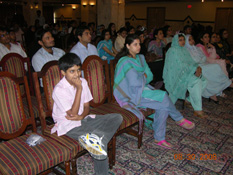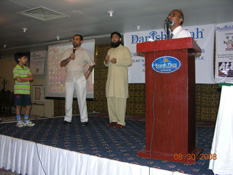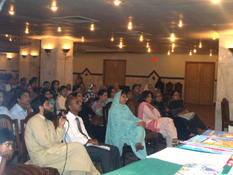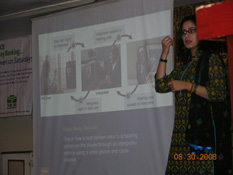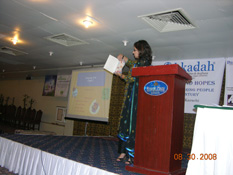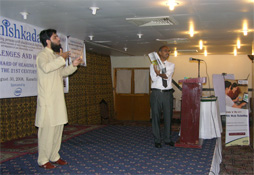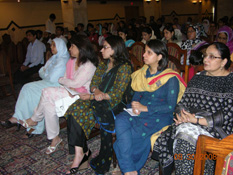


In this page; Program Deatil, speakers' Introduction, Seminar's Report, Photos from seminar
Date: Saturday, August 30, 2008,
Time: 03:00pm to 07:00pm
Venue: Regent Palza Hotel, Karachi
Registration: for registration email to info @ danishkadah.org.pk
Accessiblity: Hall (Opal-A) is accessible by stairs and lift. Shall you need assistance don't hesitate to ask the hotel staff.
| time | description |
|---|---|
| 03:00 - 03:15 | Registration of participants |
| 03:15 - 03:20 | Recitation from the Holy Quran |
| 03:20 - 03:30 | Welcome address |
| 03:30 - 03:40 | The Way Ahead by Mrs. Rukhsana Ahsan |
| 03:40 - 03:50 | Hearing Loss: An Introduction by Muhammad Akram |
| 03:50 - 04:00 | Deaf and Dumb - by Zara Husain |
| 04:00 - 04:10 | Development of 1st ICT tools for the deaf at UNDP by Sadaf Junaid Zuberi |
| 04:10 - 04:20 | Cochlear Implant (CI): Fears and Hopes - by Amber Zubari |
| 04:20 - 04:35 | Barrier Free Information Highway: - Access to information and communication by Muhammad Akram |
| 04:35 - 05:45 | AT and IT in education by Zara Husain
|
| 05:45 - 06:00 | Promoting AT and IT in developing counties by M. Akram |
| 06:00 - 06:30 | Speech of the Chief Guest |
| 06:30 - 06:40 | Vote of thanks and group photo |
| 06:40 - 07:00 | Refreshments |
 Zara Husain graduated with an MSc in Technology in Special Education from the prestigious Johns Hopkins University, USA in May 2008. Prior to that, she was a gold medalist in her graduating class of 2003 with MA in Special Education from University of the Punjab, Lahore. She has the distinction of being the first ever hearing impared student in Pakistan to be bestowed with this honour. She completed her BA from Kinnaird College Lahore. Ms Husain represented Pakistani Deaf community at the World Bank Disability Conference in December 2004. She studied International Development at Gallaudet University, Washington DC in 2005 and had two years of work experience in its primary schools and Office for students with Disabilities. She is intent on starting a PhD in Special Education in the spring of 2009. On her recent visit to Pakistan Ms Husain has successfully established a School for language & technology integration in the Lahore speech clinic that her mother has been running since 2001. Zara Husain's interview/article can be accessed at: Johns Hopkins University's Magazine
Zara Husain graduated with an MSc in Technology in Special Education from the prestigious Johns Hopkins University, USA in May 2008. Prior to that, she was a gold medalist in her graduating class of 2003 with MA in Special Education from University of the Punjab, Lahore. She has the distinction of being the first ever hearing impared student in Pakistan to be bestowed with this honour. She completed her BA from Kinnaird College Lahore. Ms Husain represented Pakistani Deaf community at the World Bank Disability Conference in December 2004. She studied International Development at Gallaudet University, Washington DC in 2005 and had two years of work experience in its primary schools and Office for students with Disabilities. She is intent on starting a PhD in Special Education in the spring of 2009. On her recent visit to Pakistan Ms Husain has successfully established a School for language & technology integration in the Lahore speech clinic that her mother has been running since 2001. Zara Husain's interview/article can be accessed at: Johns Hopkins University's Magazine
Muhammad Akram is the founder and chairman of DANISHKADAH, a non profit organization for the empowerment and leadership of people with disabilities. He has more than 7 years experience in disability movement and received training on web base networking and accessible web from Asia Pacific Development Center on Disability (APCD) Thailand, and Leadership training from IFHOHYP - European youth Center. His book on "information accessibility" is well received. He presented a paper at UNESCAPE Bangkok-Thailand on "Accessible Tourism from the perspective of the deaf and hard of hearing" and this Paper has been translated into more than 12 languages. He attended seminars, conferences and training programs, as a participant, speaker, and organizer, both in Pakistan and abroad. He is the first and only member of Association of Late Deafened Adults (ALDA) from Pakistan. He is supporting local and international organizations for persons with disabilities. His future dream is to build a "knowledge park" where Information and Assistive Technologies will be employed to empower persons with disability and deafness.
Program was started with the recitation of Holy Quran by Mr. Ismail.
The founder of Danishkadah, Mr. Akram, then addressed a welcome message to the participants and guest, and said that we organized this seminar for awareness and information exchange, and Danishkadah is always eager to bring more knowledge from around the world.
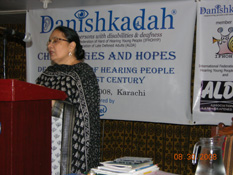 Mrs. Rukhsana Ahsan, a supporter and friend of Danishkadah congratulated Mr Akram on organizing the seminar and said that such gatherings, workshops, conferences etc. are very important as they help in disseminating knowledge. She said that persons with disabilities face multiple problems
Mrs. Rukhsana Ahsan, a supporter and friend of Danishkadah congratulated Mr Akram on organizing the seminar and said that such gatherings, workshops, conferences etc. are very important as they help in disseminating knowledge. She said that persons with disabilities face multiple problems
a) due to disability, b) barriers placed by society
In spite of all these difficulties they manage to overcome all the obstacles and lead independent lives alongside able bodied persons, and this is indeed very commendable. Some have gone to greater heights like Ms Zara who outdid her hearing colleagues and achieved great laurels in the academic field here and abroad.
Mrs Ahsan commented on Mr Akram’s admirable work in Computer technology and web designing and said that such success stories prove that nothing is impossible and a person can achieve anything with determination and hard work. She emphasized the need to improve English language skills as this was the key to success and concluded her talk by urging all persons with disabilities to unite and raise a strong voice to demand their rights.
Hearing Loss: an Introduction
 Mr. Akram gave a presentation on "Hearing Loss: an introduction" in which he explained the differences between Deaf, Hard of Hearing, and Late deafened people, and introduced International NGOs that represents each group. He said that in the past we support deaf but ignored other groups. Now we will promote Hard of Hearing and Late deafened people too, and will bring harmony among all the groups. He also stated that Danishkadah is already a member of International Federation of Hard of Hearing Young People (IFHOHYP) and he is personally an individual member of Association of Late Deafened Adults (ALDA) Inc., and we are promoting HOH and Late deafened not only in Pakistan but also in Asian countries, as these two organizations are not active in Asia but only in USA and Europe.
Mr. Akram gave a presentation on "Hearing Loss: an introduction" in which he explained the differences between Deaf, Hard of Hearing, and Late deafened people, and introduced International NGOs that represents each group. He said that in the past we support deaf but ignored other groups. Now we will promote Hard of Hearing and Late deafened people too, and will bring harmony among all the groups. He also stated that Danishkadah is already a member of International Federation of Hard of Hearing Young People (IFHOHYP) and he is personally an individual member of Association of Late Deafened Adults (ALDA) Inc., and we are promoting HOH and Late deafened not only in Pakistan but also in Asian countries, as these two organizations are not active in Asia but only in USA and Europe.
Deaf & Dumb
 Next, Ms. Zara Husain began her keynote address with the term "Deaf and Dumb". She showed a presentation with a short video from Lahore on a government supported deaf institution, "Gung Mahal, School for the Deaf and Dumb," where the school is based in Lahore. She said that Gung means Dumb, and Mahal means Palace so it is inferred to as Palace for the Dumb? Dumb also means Stupid so does that mean a palace for the stupid? She has condemned the use of Deaf and Dumb in all set ups of educational and social organizations for the Deaf, by saying that we are all equal, and we should try to convince the government to delete the use of Deaf and Dumb. She also emphasized that the differences on hard of hearing or deaf should not be highlighted; both groups should be working together to accept the terms of Deaf and promote themselves as well to help in the development of Deaf and hard of hearing community to progress.
Next, Ms. Zara Husain began her keynote address with the term "Deaf and Dumb". She showed a presentation with a short video from Lahore on a government supported deaf institution, "Gung Mahal, School for the Deaf and Dumb," where the school is based in Lahore. She said that Gung means Dumb, and Mahal means Palace so it is inferred to as Palace for the Dumb? Dumb also means Stupid so does that mean a palace for the stupid? She has condemned the use of Deaf and Dumb in all set ups of educational and social organizations for the Deaf, by saying that we are all equal, and we should try to convince the government to delete the use of Deaf and Dumb. She also emphasized that the differences on hard of hearing or deaf should not be highlighted; both groups should be working together to accept the terms of Deaf and promote themselves as well to help in the development of Deaf and hard of hearing community to progress.
Sign Language ICT tool
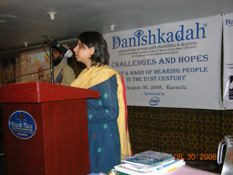 Next, Ms. Sadaf Junaid Zubari talked about the first ICT tool that was developed by UNDP, IUCN in collaboration with PAD. She said that it took one whole year to develop this CD that includes the development of 50 signs on environment related terms. And this CD is being distributed free of cost.
Next, Ms. Sadaf Junaid Zubari talked about the first ICT tool that was developed by UNDP, IUCN in collaboration with PAD. She said that it took one whole year to develop this CD that includes the development of 50 signs on environment related terms. And this CD is being distributed free of cost.
Mr. Mansoor Abdul Majeed, vice president of PAD giving input on ICT tool, said that we thank to UNDP-IUCN for the CD. This CD is very beneficial not only for the deaf but also for the other people who like to learn Pakistan Language, such as teachers, parents, relatives and friends of the deaf person. He said that the main advantage of the CD is self-learning; you don't need to go anywhere to learn because you can learn it on your PC at your home.
Cochlear Implant
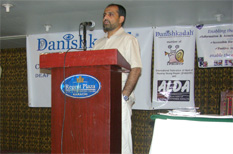 Mr. Mujahid Zuberi, father of Hayyan, (a deaf boy who got Cochlear Implant (CI) talked about their experience. He said that first we tried to develop Hayyan's speech with the help of hearing aids but did not succeed. He learned only few words to speak. Later we heard about CI and after discussions with a doctor, we got him a CI from Lahore and the surgery was conducted by a foreign doctor.
Mr. Mujahid Zuberi, father of Hayyan, (a deaf boy who got Cochlear Implant (CI) talked about their experience. He said that first we tried to develop Hayyan's speech with the help of hearing aids but did not succeed. He learned only few words to speak. Later we heard about CI and after discussions with a doctor, we got him a CI from Lahore and the surgery was conducted by a foreign doctor.
Explaining the fears and misconceptions about Cochlear Implants, he said there is nothing to worry about, no risk for brain damage or anything. Mashallah, Hayyan is doing great after having his CI. He is 8 year old now and his progress in school is very well. Talking about speech therapy, he mentioned that both he and his wife, Hayyan's mother, have put a lot of effort on developing their son's speech. Answering to a question from the audience, he admitted that CI is very expensive, cost about 15 hundred thousand rupees, and there is no support from anywhere, and parents have to arrange the funds on their own.
Barrier Free information Highway:
Mr. Akram gave a presentation on the barriers of Information exchange, first he explained that assistive technologies is not a solution alone, we also need an accessible environment and positive attitude along with the assistive technologies. He gave 2 examples about environment, one on the pic of a wheelchair user and another form, screen reader user. He said that giving a wheelchair to a physically challenged person will not solve the problem therefore we need to do more; we need to remove the barrier from the environment by providing slops/ramps. And just having a screen reader for a blind man is not enough if the environment in where the screen reader works (website or software) is not accessible, blind persons would not have equal access to information highway.
After that he gave some examples about which barriers exist and how to solve them. He recommends that:
Assistive / Information Technology in Education
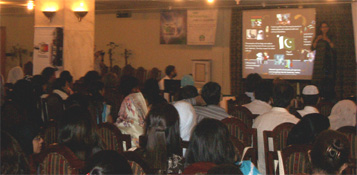
In the key note address, Zara Husain highlighted important summaries on the definition of Assistive Technology, the legislations and policy on Assistive Technology in Pakistan and USA, saying that USA has a law passed on Assistive technology and the use of Assistive technology in education, but in Pakistan, there is a National Policy mentioning only two paragraphs on Information and Assistive Technology and the application of these two technologies in Pakistan such as provision of hearing aids, walker, orthopedic surgery, provision of braces and prosthetics for physically handicapped etc. Then she explained three levels of Assistive Technology: Low, Mid and High level of Assistive Technologies. The low level Technology does not have speech or electronic output. It has a printed material or a tool that has no programming or storage capabilities such as magnifier, ruler, colored paper, textbook, highlighter and puzzle. Middle level technology has either one of the following: electronic, audio or speech output such as tape recorder, cassette player, or simple switch. High level technology has programming, audio and speech out put and storage capabilities such as a cell phone, computer, dvd, etc.
On the second topic of Application of IT in Education, she explained her teaching philosophy on a framework as to what an education for All students should be in Pakistan and how the students can become successful with each step of teaching philosophy and how the students' success can help Pakistan progress. Each step is as : Teacher-Student relationship, cultures and religions education, differentiated instructions through technology, Networking and Graduation. She then gave a presentation on Differentiated Instruction and demonstrated three lesson plans using differentiated instructions and applied Information Technology of PowerPoint in lesson making. The three lesson plans were titled, Twinkle Twinkle Little Star, Identification of Alphabets with Objects, and Accommodations and Modifications.
On the last topic of Accommodations and Modifications, She defined each and gave examples of each, then emphasized on the use of low, middle and high level of technology to be used as accommodations and modifications in the classroom to meet the unique needs of individual learners. Then she showed how to make a class profile matrix and include accommodation and modifications for each student in the matrix. The matrix will be used to help the teacher easily plan the curriculum and lesson plan while having the needs of each students met.
Promoting AT and IT in developing countries
In this presentation Akram gave an example for Thailand that there an organization developing assistive devices. And according to them a device that cost 100 dollars in USA we develop same device just in 10 Dollars. Akram Said why can't we do the same, we have talented engineers, if collaborate with universities it is possible to develop low cost assistive devices locally.
Following are the out line of his presentation;
Dr. Saira Bano from Kalia Group
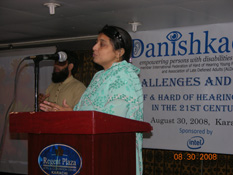
Appreciate the efforts of Danishkadah and said I am happy to meet Zara, and admire her success in education, despite of her deafness. She said give more attention to media as media is powerful tool for awareness raising. She offered a meeting and said that bring your projects we can discuss to collaborate further.
Finally the founder and chairman Danishkadah thanked to all the participants and guest, and said we are planning to organize more workshops and seminar in future, those who are interested keep in touch via email for further information.
